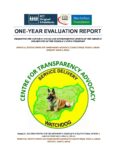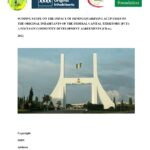Background and reason/purpose for the study
The Original Inhabitants (OIs) of the FCT were made stateless following the creation of
Abuja as the capital of Nigeria. The implications were that the people lost their livelihood,
identity, environment, and voice among others most especially causing a cultural genocide.
Poor resettlement, inadequate access to basic amenities like water, roads, electricity,
healthcare, education, and loss of their cultural heritage are some of the issues affecting these
communities. The resource curse though abundant in the country is prominent among the
OIs. The main objective of the study is to enlighten the public and the relevant stakeholders
about the issues these indigenous communities face and provide strategic information needed
with suggestions on how to solve these issues. This aligns with the United Nations
Sustainable Developmental Goal 3 (Good Health and Well-Being), Goal 6 (Clean Water and
Sanitation, Goal 8 (Decent Work and Economic Growth), Goal 14 (Life below Water), and
Goal 15 (Life on Land). The need for Host Communities to have a better understanding and
involvement in the Community Development Agreements and how to use this to improve
their socio-economy, protect their cultural heritage and enjoy the freedom that has all been
negatively affected by mining/quarrying activities, prompted the need for this study. This
report is part of a larger project on the MacArthur Foundation-sponsored project that was
commissioned by the Centre for Transparency and Advocacy Centre (CTA), Abuja, Nigeria.
The methodology adopted for this study started with desk reviews of relevant national and
international documents. Fieldwork and surveys were also done. The focus group discussions
(FGDs) and interviews were carried out for a deeper understanding of the effect of mining on
the communities. The interviews were conducted using the questionnaire administration
format. Women, youths, and children (with the consent of the guardians/parents) were also
interviewed. The selections of the interviewees were targeted because of their age, their
cultural beliefs, knowledge of their history and culture, role in the community, and how
mining directly or indirectly affects their standard of living. About a hundred persons across
Karishi, Kubwa, Kuje, and Mpape were interviewed. This covered three Area Councils
(Abuja Municipal, Bwari, and Kuje).
CLICK BELOW TO READ FULL REPORT……



